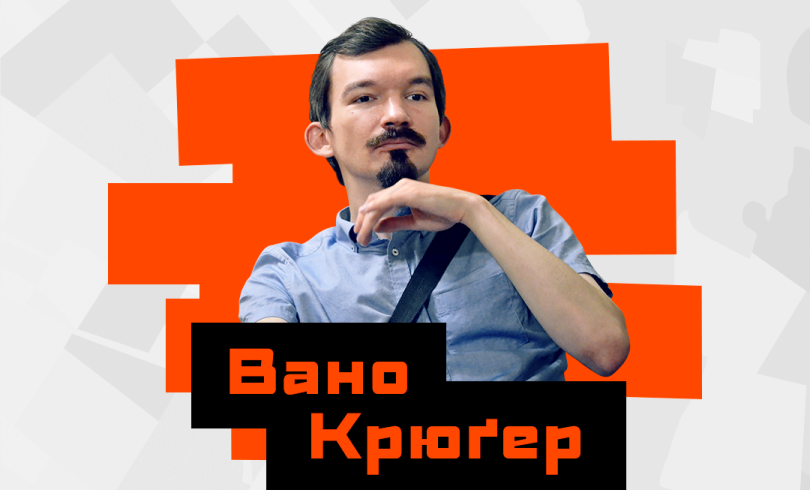Save love, find language
Vasyl Holoborodko grapples with the challenge of writing poems about war, which he finds inherently absurd. How does one put words to something so inherently senseless? War, he notes, presents a challenge not just to human life but to language itself. Yet, as he reflects, language abhors a vacuum and seeks to fill it, much like a healthy body mends a wound. He points out the remarkable fact that, despite the vast literature on the First and Second World Wars, it was the imagination of J.R.R. Tolkien, a scholar and a soldier, who best captured the language needed to describe the current war in Russia against Ukraine, through terms like „orcs“ and „Mordor.“ In Holoborodko’s view, myth often speaks more eloquently than reality itself. As Oscar Wilde famously observed, „life imitates art.“ And yet, only some authors can see their own life reflected in their work. Holoborodko feels fortunate to be among the few who can claim this rare privilege.
I’m referring to my second poetry book, Ziggy Freud & Cthulhu, which was published before the Russian Federation’s full-scale invasion of Ukraine. I’ve always regarded it as a collection of love lyrics, which explains why the first edition sold out rapidly and why it’s the sole book among my works to receive an award, namely, the Oles Honchar International Ukrainian-German Literary Prize. This volume is perhaps the most reader-friendly of all my books, which accounts for its success.
The longest verse in my book is a nod to Philip K. Dick’s Do Androids Dream of Electric Sheep? and describes a desolate Kurenivka, my district in Kyiv, filled with the competing sounds of rain, sirens, explosions, and gunfire. Meanwhile, Russian forces have seized control of two nuclear power plants in Chornobyl and Zaporizhzhia, and are poised to unleash cyberpunk-style chaos on Ukraine. As life imitates art, I reflect that art and beauty are never completely safe or predictable. Against this backdrop, I sat by candlelight (as the enemy’s sabotage and intelligence units threatened the electricity supply) and recalled that Oleh Lysheha had once proposed calling his afterword to this book „De Bellis“ („On Wars“) in Latin.
Say what you want but in our time
one cannot do without Latin –
But who among us knows, for example,
How to say „weeping willow?”
In the end, he named it „Behind the clouds collapsed…“ with Pavlo Tychyna’s words, the poet who took Ukrainian poetry to the cosmic expanse!
And these lines have a continuation … they rumble like in hell!
To find yourself in your own book is to find yourself in hell.
Hell has different circles, so detailed – more detailed than Purgatory and Paradise – written by Dante.
Concentric.
They are slowly going down.
Further from the Light.
Deeper into the darkness.
Andriy Honcharuk, the publisher of this book, is a soldier who fought in the trenches in the worst frosts of this winter.
Sixty meters to the enemy.
In the trench.
In the freezing cold.
Under fire
The snow this winter did not bring joy.
But the new year brought it – Andriy and his brother returned from the front safe and sound.
And that’s why this new year is the best new year ever.
As Meister Eckhart once observed, we are defined by those we love. However, the inverse is also true: we are shaped by those we hate. Both love and hate create intense emotional bonds, and as such, they are not truly opposing forces. Instead, they share a common opposite, which is detachment.
Meanwhile, when Russian forces destroyed the museum of Hryhoriy Skovoroda during the year of his tricentennial, certain „patriots“ and moralists demanded that the names of Pavlo Tychyna and Mykola Bazhan be removed from Kyiv avenues. Their reasoning? Tychyna and Bazhan refused to compromise their principles and transform themselves into posthumous symbols of heroic martyrdom.
Moralism has no tolerance for the living; they are always held responsible for the mere fact of their existence. On the other hand, it shows great affection for the deceased, the tormented, and those who are condemned to die. It continuously demands more and more victims.
The moralistic attitude towards life is crystal clear: you are deemed guilty as long as you are alive. The solution? Kill yourself and we’ll venerate you posthumously. But if you don’t want that, we will do the honors and end your life. This love of death is the essence of moralism.
It is evident that the Russian occupiers are not only interested in physically destroying Ukrainian cities and its people but also in eradicating its identity, individuality, and uniqueness – everything that Ukraine has to offer to the world and has every right to be proud of. By targeting civilian infrastructure, the Russian Federation is seeking to plunge Ukraine into the same darkness in which it finds itself. Moralists behave like prisoners, wielding sledgehammers to crush the heads of their peers who fail their trial. They only aid and abet such behavior.
Thus, to not be a Russian occupier, one must also abstain from being a moralist and refrain from participating in their trials – this is the very first principle of hygiene in our current situation. It is essential not only to preserve the Hryhoriy Skovoroda museum but also to keep the names of Pavlo Tychyna and Mykola Bazhan on Kyiv’s streets. Love entails accepting the shortcomings, faults, and even crimes of those we hold dear.
The idea that God is not fair because He forgives everyone is a thought-provoking one. And so, I implore you to at least forgive your people.
Initially, I was tasked with writing about the war. However, it inevitably became about those I hold dear – Vasyl Holoborodko, Oscar Wilde, Oleh Lysheha, Pavlo Tychyna, Andriy Honcharuk, Meister Eckhart, Hryhoriy Skovoroda, and Mykola Bazhan. Because preserving love is far more crucial than finding the right words to express it.
Translated by Yulia Lyubka and Kate Tsurkan











